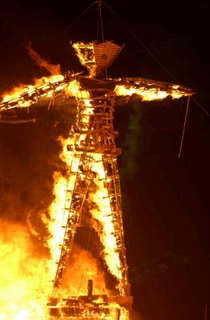
What does a “counter-cultural” festival like Burning Man have to do with church and Christianity in America? Perhaps more than we might think.
Today I will be picking up some items to include in my survival gear for my attendance and participation in the 2006 Burning Man Festival coming up August 28 – September 4, with the theme Hope & Fear: The Future. I am going with a small group from two churches in northern California, including Fair Oaks Presbyterian Church and Shadowridge Church. The group is attending in order to learn about this interesting subculture, and to consider its ramifications for missions in their local church contexts. This is of interest to me as well, and my attendance also serves as my summer missions project for seminary study. In addition to my reading of academic and popular treatments on the festival, I will write a project paper that brings together my participant observation at the festival, the readings, and other studies I have done in the areas of anthropology of pilgrimage and culture. The paper will sketch the history and development of Burning Man and look at the missiological and ecclesiological implications of the festival.
But back to my original question that I began this post with: What does Burning Man have to do with church and Christianity in America? While it is often characterized by the media as little more than a place for adults to thumb their nose at authority and traditional expressions of Western culture, scholars have recognized the religious significance of the Burning Man experiment in intentional community. Sarah Pike of California State University, Chico has written that this religious significance is
“characterized by powerful ritual, myth and symbol; experiences of transcendence or ritual ecstasy; experiences of personal transformation; a sense of shared community; relationship to deity/divine power, and, perhaps most importantly, sacred space.”Most importantly, these characteristics take place in “an important cultural and religious site that exemplifies the migration of religious meaning-making activities out of American temples and churches and into other spaces.”
Pike concludes the introductory portion of her essay by stating that, “I want to suggest that popular religious sites like Burning Man festival are essential to an understanding of contemporary issues and future trends in American cultural and religious life.”
I think Pike is right, and my hope is that our experiences and research at Burning Man can bring helpful lessons to those in missional churches and the emerging church. I will post reflections and pictures here at the conclusion of the festival in early September as my schedule permits.
(Citations are from Sarah M. Pike, “The Burning Man Festival: Pre-Apocalypse Party or Post-modern Kingdom of God?,” The Pomegranate 14 (August 2000): 27-28. The essay was reprinted as “Desert Goddesses and Apocalyptic Art: Making Sacred Space at the Burning Man Festival” in Michael Mazur & Kate McCarthy (eds), God in the Details: American Religion in Popular Culture [Routledge, 2001].)
Image source: http://phillips.blogs.com/photos/uncategorized/410_burning_man.jpg. All Burning Man images are the intellectual property of Burning Man LLC.
2 comments:
I'll look forward to your post-festival reflections John
As someone who was raised in the church, I think that the Burning Man experience is important for Christians to understand for many important reasons in addition to the ones you stated.
I attended Burning Man in 2004, and it made an impact on me that persists to this day. The greatest impact came from the experience of community. The harsh environment and strong emphasis on self-expression creates a dynamic that results in a much greater openness than our urban alienated culture allows for.
A simple example: If I'm walking down the street and I smile and say hello to a woman walking by, I'm usually ignored or given a nervous glance, often followed by clutching her purse. That woman is just as likely to be a Christian as a non-believer, but that is the world we live in - we're either afraid of each other, and/or we feel we don't have time for people outside of our little universe.
The world of Burning Man isn't as fearful and self-absorbed. I'm not saying it's all hand-holding and flowers, but I would say with confidence that most people go there with the intention of being more open and accepting of others. If Christians could emulate just that one characteristic, churches would be standing room only. Unfortunately, the deeply-rooted influence of an insular culture (both secular AND Christian) makes that an unrealistic possibility until there's a major change in how the church sees itself in relation to non-believers.
The walls between people aren't as high at Burning Man, and for that reason alone, Burning Man is a tremendous opportunity to get a clear vision of what's possible in the world we create for ourselves.
Frank Rodriguez
www.organicphoto.com
Post a Comment